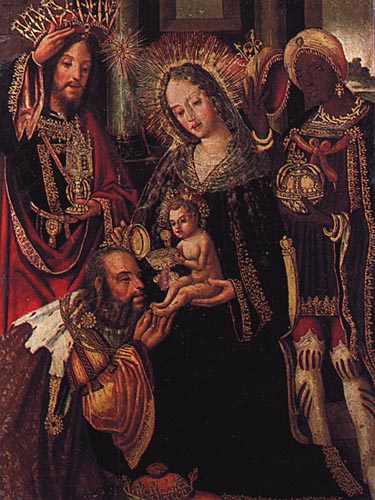
The magi set forth an example of the heart that all of us need to have when it comes to stewardship of our material blessings. They knew their own poverty of spirit, and gladly gave the riches of this life for the blessing of eternity: worship. Their almsgiving, then, had a particular attitude attached to it. They did not see the holy family as mere victims of an unjust world, but as persons worthy of their investment, the Child whom they worshiped most of all.
As we approach the Feast of the Nativity of Jesus Christ (Christmas), I think an additional application is worth reflecting on: whenever we give alms, we, like the magi, also pay homage to God incarnate.
Jesus teaches the following in the Gospel of St. Matthew:
When the Son of Man comes in His glory, and all the holy angels with Him, then He will sit on the throne of His glory. All the nations will be gathered before Him, and He will separate them one from another, as a shepherd divides his sheep from the goats. And He will set the sheep on His right hand, but the goats on the left. Then the King will say to those on His right hand, “Come, you blessed of My Father, inherit the kingdom prepared for you from the foundation of the world: for I was hungry and you gave Me food; I was thirsty and you gave Me drink; I was a stranger and you took Me in; I was naked and you clothed Me; I was sick and you visited Me; I was in prison and you came to Me.”
Then the righteous will answer Him, saying, “Lord, when did we see You hungry and feed You, or thirsty and give You drink? When did we see You a stranger and take You in, or naked and clothe You? Or when did we see You sick, or in prison, and come to You?” And the King will answer and say to them, “Assuredly, I say to you, inasmuch as you did it to one of the least of these My brethren, you did it to Me.” (Matthew 25:31-40)
When we give alms to the poor among us, who are made in the image of the God who “became poor, that [we] through his poverty might become rich” (2 Corinthians 8:9), we give unto the Lord himself. And the return that comes from such giving, virtue and holiness, makes it a great exchange indeed.
While we most certainly ought to be wise and prudent about how we give alms, we also most certainly ought to give alms, even more for its spiritual value than any material benefit it may provide.
Read my entire Acton Commentary here.
Merry Christmas!